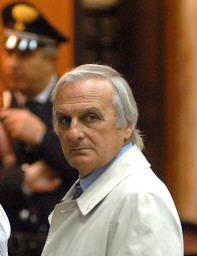Public prosecutors in a Milan trial into the financial meltdown of dairy and food multinational Parmalat asked judges on Monday to sentence the group's founder, Calisto Tanzi, to 13 years in prison.
In the trial, which focuses on stock market aspects of Parmalat's downfall, Tanzi is accused of market rigging, false auditing and hindering the regulatory activities of bourse watchdog Consob.
Earlier on Monday prosecutor Francesco Greco underlined the co-responsibility of banks in the Parmalat fiasco, which the US Securities and Exchange Commission called ''one of the largest and most brazen corporate financial frauds in history''.
Prosecutors also asked for five-year jail terms for former Parmalat independent advisors Paolo Sciume' and Luciano Silingardi, four years for advisor Enrico Barachini, and three and a half years for former head of Parmalat Venezuela, Giovanni Bonici.
Three former employees of the Bank of America - Luca Sala, Luis Moncada and Antonio Luzi - should receive terms of six, five and three and a half years respectively, prosecutors said.
They also asked judges to confiscate 600,000 euros from auditing firm Italaudit, the former Italian unit of Grant Thornton, as well as fining the firm 300,000 euros.
All the defendants stand accused of charges including market rigging, false auditing, misleading investors and hindering the watchdog.
Co-prosecutor Eugenio Fusco told judges the requested sentences took into account ''the particular gravity of the crime'', describing it as ''an unrepeatably serious rigging of the market''.
BANKS' ROLE.
Parmalat was declared bankrupt in December 2003 after it emerged that four billion euros it supposedly held in an offshore Bank of America account did not in fact exist.
The case escalated, eventually leading to Parmalat's collapse amid debts of some 14.5 billion euros - the biggest in Europe - and a fraud scandal which rocked the Italian financial world.
From 1990 until 2002, Parmalat lost money every year except one but nonetheless reported uninterrupted profits and routinely forged documents in order to deceive banks and regulators.
Parmalat's bankruptcy left more than 150,000 investors with virtually worthless bonds.
Greco said Monday that banks had continued to float Parmalat bonds on the market despite knowing the multinational was insolvent and singled out the Bank of America for special blame.
The bank had ''all the information imaginable and knew (Parmalat) considerable better than any of the other (banks),'' he said, adding that Bank of America had managed dealings with investors in the multinational.
OTHER PARMALAT TRIALS.
The probe into Parmalat's collapse is divided in two, with Milan magistrates handling aspects relating to the stock market, including charges of issuing false information to mislead investors and stock market regulators, and Parma prosecutors focusing on alleged fraudulent bankruptcy, false accounting and other related charges.
In a second Milan trial, 13 individuals and five international banks - Bank of America, Morgan Stanley, Deutsche Bank, UBS and Citigroup - are accused of share-price manipulation and organising bond issues to cover their own potential losses, in the event Parmalat defaulted on loans they had extended to it.
Parmalat CEO Enrico Bondi also testified to the court that the banks knew ''without a doubt'' that the group could not pay its bonds but continued to help float them, often at higher than market rates.
As well as a main trial into the Parmalat collapse in Parma, two others are ongoing into Parmalat's acquisition of the mineral water company Ciapazzi and the bankruptcy of Parmalat's tourism division Parmatour.
A fourth Parma trial focusing on Parmalat's 1999 purchase of milk company Eurolat from Cirio, another food giant which subsequently went bankrupt, is in preparation.
Parmalat has since been put back on its feet by corporate turnaround expert Enrico Bondi who, first as government-appointed administrator and later as official CEO, shed the group's non-core activities, cut foreign activities and reduced staff.




